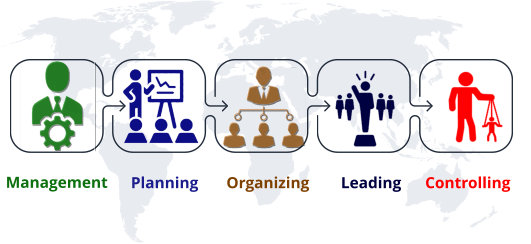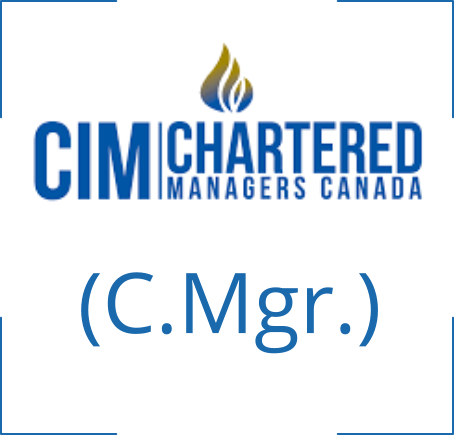 +968 2461 3152
+968 2461 3152 info@etioman.com
info@etioman.com

Verify your ability to manage and lead with the Certified Manager Certification.
The Certified Manager (CM®) certification is a professional credentialing program that verifies an individual's ability to manage and potential to lead with a level of competency. CM certification is attained by meeting eligibility requirements for education and experience, and passing a series of three CM assessment exams. Program applicants should have prior work experience, but may or may not hold a management title. Employers look to the CM certification to distinguish candidates for hiring and career advancement.
The Certified Manager certification is offered to fit your specific needs. The 90-hour certification prep program covers essential tools and principles for quality management practice that is applicable to any industry. Applicants are allowed 15 months to pass the CM exams and earn the CM certification from the Institute of Certified Professional Managers. Successful applicants also earn the privilege to use the "CM" professional credential as a sign of their competency. Participants can apply online at any time by completing the CM application and purchasing program materials.
Through a comprehensive, 3-module program of training and assessment, ICPM certifies a level of management competency and leadership potential which is recognized worldwide by the Certified Manager® (CM) credential. CM certification is appropriate for managers and supervisors working in all industries. The CM body of knowledge covers the following essential skills and content areas: Management Fundamentals, Planning & Organizing, Leading + Controlling.
CM certification is highly sought after in today’s workplace because:
- It enhances management and leadership knowledge, skills and ethics
- It develops confidence and improves on-the-job performance
- It verifies a level of management competency and leadership potential
- It demonstrates a commitment to continuing professional development
- It offers a competitive edge for employee selection and advancement
- It adds credibility to organization’s that invest in quality management
The Certified Manager BOK is organized into 3 modules. The knowledge domains of each module are assessed by a corresponding CM certification exam (three exams in total). Eligibility requirements must be met and three CM certification exams passed to earn the CM Certification. CM applicants have the option to purchase study materials to facilitate their preparation to take the certification exams

Institute of Certified Professional Managers
James Madison University - JMU
United State of America - USA.
Register Now Download Bruchore



Use of the CM® Credential
As a Certified Manager, you earn the right to use the CM® professional credential after your name ( Your Name,CM ). This credential denotes a level of managerial competency that is recognized worldwide and sets you apart from other professional managers.

In Demand Management Skills
ICPM’s certification materials comprise a comprehensive learning system that develops managerial knowledge, skills, and abilities that are in demand in today’s workplace. The application-based materials contain tools and practices that can be put to use right away!

Opens A New Opportunities
The CM® credential opens doors for managers and leaders seeking employment or desiring to advance their careers. CM work in Fortune 500 companies, government, agencies, universities, the military, and more. They span all industries without exclusion.

Global Recognition
CM certification is a globally recognized brand with Certified Managers living and working globally. The CM® credential is portable, enabling recognition for hiring and advancement in all parts of the world, including the United States, Asia, Europe, Africa, and the Middle East.
The Certified Manager certification is the product of a comprehensive job task analysis of the management profession to identify the knowledge, skills, and abilities required for competent performance on-the-job.Upon attaining CM certification, certificates will possess proof of their qualification to manage and lead in the workplace. CM certification empowers certificants to take control of their careers by positioning themselves for advancement.
Go ahead-Build a future!


Content Includes:
1. The Management Process Today
– What is Management
– Essential Managerial Tasks
– Levels and Skills of Managers
– Recent Changes in Management Practices
– Challenges for Management in a Global Environment
2. Characteristics of Managers
– Enduring Characteristics: Personality Traits
– Values, Attitudes, Moods and Emotions
– Emotional Intelligence
– Organizational Culture
3. Ethics and Social Responsibility
– The Nature of Ethics
– Stakeholders and Ethics
– Approaches to Social Responsibility
4. Managing in Global Environment
– What is the Global Environment?
– Task Environment
– The General Environment
– The Changing Global Environment
– The Role of National Culture
5. Managing for Sustainability
– Introduction to Sustainability
– Business and the Environment: Conflicting Views
– Why Manage with the Environment in Mind?
– What Managers Can Do
– Opportunities for Making a Business Sustainable
6. Promoting Effective Communication
– Communication and Management
– Information Richness and Communication Media
– Communication Networks
– Technology and Communication
– Communication Skills for Managers
7. Decision Making
– The Nature of Managerial Decision Making
– Types of Decisions
– The Decision Making Process
– Gathering and Assimilating Input
– Behavioral Influences on Decision Making
– Group Decision Making
– Creativity in Group Decision Making
– Techniques for Stimulating Group Creativity
8. Using I.T. to Increase Performance
– Information and the Manager’s Job
– The IT Revolution
– Types of Management Information Systems
– The Impact and Limitations of Information Technology
9. The Legal Environment and Managing Risk
– The Case for Business Laws
– Business Laws that Impact Managing
– Promoting Competitive Business Practices
– Understanding Business Risks
10. Economics and How It Affects Business
– How Economics Affects Business
– Economic Systems
– Understanding Key Economic Indicators
– Tools for Economic Stabilization

Content Includes:
1. Planning and Strategy
– The Planning Process
– Determining the Organization’s Mission and Goals
– Formulating Strategy
– Formulating Business-Level Strategies
– Formulating Corporate-Level Strategies
– Implementing Strategy
2. Value-Chain Management
– Creating Competitive Advantage
– Improving Responsiveness to Customers
– Improving Quality
– Improving Efficiency
– Improving Innovation
3. Organizational Structure &Culture
– Designing Organizational Structure
– Grouping Tasks into Jobs
– Grouping Jobs into Functions and Divisions
– Coordinating Functions and Divisions
– Organizational Culture
4. Managing a Diverse Workforce
– Workforce Diversity
– Perception
– Managing Diversity
– Harassment
5. Building High-Performance Teams
– Why Teams?
– The Stages of Team Development
– Team Management
6. Human Resource Management
– Human Resources
– Strategic Human Resource Management
– Recruitment and Selection
– Training and Development
– Performance Appraisal and Feedback
– Pay and Benefits
7. Coaching and Performance Teams
– What is Coaching?
– Coaching Skills and Characteristics
– What is Performance Feedback?
8. Networking and Mentoring
– What is Networking?
– What is Mentoring?
9. Project Management
– Project Management Hierarchy
– 5 Phases of the Project Life Cycle
– Common Project Management Elements
– Managing Project Risk
– Project Management Methodologies
10. Running Effective Meetings
– Overview
– Structure of an Effective Meeting
– Essential Meeting Elements
– Types of Meetings
– Dysfunctional Meeting Behaviors

Content Includes:
1. Leadership
– The Nature of Leadership
– Models of Leadership
– Gender and Leadership
– Emotional Intelligence and Leadership
– Developing as a Leader
2. Motivation and Engagement
– The Nature of Motivation and Engagement
– Expectancy Theory
– Need Theory
– Equity Theory
– Goal-Setting Theory
– Learning Theory
– Pay and Motivation
3. Managing Change
– The Basics of Change
– The Process of Change
– Managing Change
4. Organizational Conflict and Politics
– Organizational Conflict
– Alternate Forms of Conflict Resolution
– Organizational Politics
5. Managing Misbehavior
– Misbehavior in the Workplace
– Management’s Responsibility for Misbehavior
6. Time and Stress Management
– What is Job Stress?
– Strategies for Time and Stress Management
7. Organizational &Operational Control
– What is Organizational Control?
– Output Control
– Behavior Control
– Clan Control
– What is Operations Control?
8. Accounting and Financial Information
– What is Accounting?
– The Accounting Process
– Key Financial Statements
– Analyzing Financial Performance
9. Financial Management
– Managements Role in Finance
– Financial Planning
– The Need for Operating Funds
– Obtaining Short-Term Financing
– Obtaining Long-Term Financing
10. and more
In order to earn the Certified Manager certification applicants must pass 3 multiple choice CM exams. The three exams that must be passed include:
- Certified Manager I: Management Essentials
- Certified Manager II: Planning and Organizing
- Certified Manager III: Leading and Controlling
Test takers receive immediate pass or fail results on-screen and by email. New CMs will receive a CM certification packet, including two copies of their CM certificate. These packets will be sent within 4 weeks after the official results of the third and final CM exam have been sent.

Together all three Certified Manager exams assess essential analytical skills, knowledge and decision-making skills in the following areas:

Exams are administered through ICPM, taken on any computer with reliable Internet access. Each exam contains 90 multiple-choice questions and is time limited to a maximum of 120 minutes.

 )?
)?
Obtain your Chartered Manager (C.Mgr.) designation
Obtain your Chartered Manager (C.Mgr.) designation from the Canadian Institute of Management (CIM) today!
ICPM has partnered with the Canadian Institute of Management (CIM) through a reciprocity agreement to offer the Chartered Manager designation to qualified Certified Managers. This is another excellent reason for individuals to earn their CM certification
What is the C.Mgr. Designation?
C.Mgr. is a prestigious, internationally recognized designation for managers and leaders. CIM also has a reciprocity agreement with the Chartered Management Institute in the UK, which extends to Australia, New Zealand and other countries, giving the C.Mgr. global reach.
Benefits of Being a Chartered Manager?
• Gaining additional international credibility
• Adding value to your organization
• Committing to highest level ethical behavior and integrity
• Developing greater self-awareness
• Standing out in the job market and developing your career
How Do CM's Qualify?
Certified Managers who meet the following conditions are eligible for the C.Mrg. designation:
• Holds an undergraduate (bachelor's) degree.
• Has at least 48 months (4 years) of management experience.
• Is up to date on their CM recertification requirements.
Getting Started
The first step is to earn your CM certification. Once you have earned your CM certification, those interested in obtaining the C.Mgr. designation should contact us at 24613152 or info@etioman.com